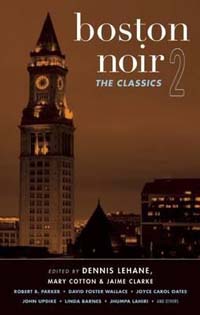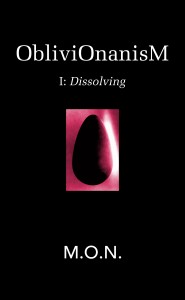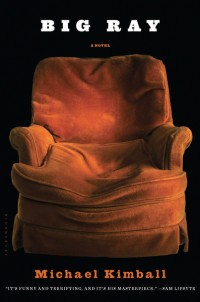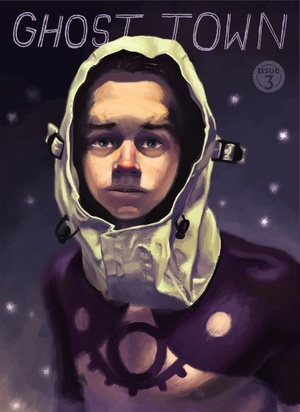Review of Boston Noir 2: The Classics
 Boston Noir 2: The Classics
Boston Noir 2: The Classics
Edited by Dennis Lehane, Mary Cotton & Jaime Clarke
Akashic Books, 2012
288 pages / Paperback $15.95; Hardcover $24.95
Buy from Akashic Books or Amazon
I dare you to find a better time to revisit noir. Exit-strategying the Middle East, clawing out of near-Depression, facing post-war fears of foreign threats, the parallels to the Fifties bares a bright opportunity to revisit its definitive form of American Escapism. And if there was a book to revisit this escapism, it’s Akashic’s new Boston Noir 2: The Classics.
Since 2004, Akashic has been producing original noir anthologies set in specific cities—Brooklyn, Baghdad, San Francisco, St. Petersburg. Dennis Lehane (Gone, Baby, Gone, Shutter Island, Mystic River) returns to co-edit along with Mary Cotton and Jaime Clarke (Post Road Magazine, No Near Exit) to bring a decadent compilation of stories and novel excerpts that open the noir genre with a rib-spreader and poke it with a knife.
Several books in the long-running series are subtitled: The Classics. Unlike sequels, these books serve as post-prequels, uncovering origins while mapping evolution. The objective is clearly summed up by the editors in the introduction:
“Noir alludes to crime, sure, but it also evokes bleak elements, danger, tragedy, sleaze, all of which is best represented by its root French definition: black.”
January 11th, 2013 / 12:00 pm
Hyper-purple Theory-porn
 ObliviOnanisM, I: Dissolving
ObliviOnanisM, I: Dissolving
by M.O.N.
gnOme Books, 2012
85 pages, $9.99
Buy from Amazon
Sometimes I dont’ trust copy. I feel like, if I read a book and then encounter copy written for it, most of the time I scowl to myself and think things like “holy shit that is so incredibly reductive.” However, in the case of ObliviOnanisM, the copy rings remarkably true:
A profanely mystical work of hyperpurple theory-porn, ObliviOnanisM is an auto-erotic intellectual fiction envisioning the phantastical unending odysses of a young woman, Gemma, whom you will never know.
It might only be a sentence long & it promises a lot, but really there’s nothing false about this description, drawn from the book’s back cover.
To get it out of the way, I’ll approach a plot description; Chapter 1:Gemma finds a semi-ovoid object and sticks it into her ass. Chapter 2-4: Gemma experiences immense pleasure from the object, from refusing to physically interact from her own body, and from her immense mental acrobatics that circle around not touching her own body. Chapter 5: Gemma doubles into another non( )being and within this phantasmatic double achieves infinitely echoed orgasms into oblivion. So, yes, the entire novella, in terms of literal action, consists of nothing beyond Gemma getting off. There are no characters other than Gemma, the action takes place in no physical location other than Gemma’s bedroom. There is no dialog. There is no character development. Arguably, this is just an 85 page masturbation scene.
So does it work? Surprisingly, yes. The “hyperpurple” prose recalls the anonymous French erotica that was so ripe to pop up in the 50s, 60s, and 70s, approaching metaphysical plateaus of the phantastique that I personally am more than prone to enjoying. The idea of “theory-porn” pitched on the back has less to do with a direct exigesis into theory & rather adapts the syntactical structure of theory and applies it to porn-writing, occasionally referencing those beacons of theory in their BwOs, their infinite becomings, their Irigaray-ian loops, their object-ness, their speculative solutions. From a subjective perspective there’s really no erotic stake I share in female-onanism (being a queer male), but there’s an interesting insistance taking place.
The phallic structure is entirely absent. The semi-ovoid (egg) shape that violates Gemma violates her ass, but not in a phallocentric plugging, there is none of the old “in-out” here, only a girl and an object and, later, her own hands, fingues, tongue. This body has organs but they dissolve into a gushy pool of sweat, spit, and come, but this doesn’t form an abject pile of abasement, rather it launches Gemma into the ethereal fluidity of the float.
Thus, to conclude, I offer a fragment taken from page 50 of the book. Your response to this excerpt is likely to determine your response to the entire book, so away we go:
January 11th, 2013 / 2:52 am
7 Blowfish Memoirs
1.
I am interested in life only in its absurd manifestation. I find abhorrent heroics, pathos, moralizing, all that is hygienic and tasteful … both as words and as feelings.
3. Mountain climber/author tells Random House to stick it over royalties for ebooks.
7.
Suddenly it was as if I’d been getting my ass kicked in an alley somewhere and realized I’d had one arm behind my back. All of my natural abilities, I saw, had been placed, by me, behind a sort of scrim. Among these were: humor, speed, the scatological, irreverence, compression, naughtiness. All I had to do was tear down the scrim and allow those abilities to come to the table.
4. New Diagram is up, you smoke-shows and over-fogged brothers.
5. Interview with founders of Recommended Reading, and you should probably go byno-border (with your gaze) recommended readings anyway I mean if you’re not at this time already.
6. This is pretty great about Daniil Kharms. It’s not brand new but I don’t really care if it follows all the rules of blogs (?) and it seems to me you can post what you want and how or whatever when discussing Mr. Kharms. I think he writes like whales (killer) sneeze.
6. Here’s a really bad poem.
25 Points: Big Ray
 Big Ray
Big Ray
by Michael Kimball
Bloomsbury USA, 2012
192 pages / $23.00 buy from Amazon
1. Big Ray blends genre between flash fiction and novel.
2. Each chapter within the work is told in first person confessional episodic moments, which read as a short flash fiction piece which could be read on its own as a complete story.
3. Each of the flash sections rarely surpass 200 words, though the sizes ebb and flow throughout.
4. Kimball heightens intensity by elongating the more anxiety-ridden sections of the book and in parallel compresses the sections which give appropriate if not beautifully told anecdotal backstory. In doing so, Kimball is showing his expertise as the mark of his incredible ability to craft story.
5. Michael Kimball is one of the nicest guys as a person in “the business.” Also, he can write. Dude can write.
6. Kimball is opening the reader to a complicated familial past quickly.
7. We are witness to Big Ray’s past and the way in which his ether has an everlasting effect on our narrator. As our narrator walks between Big Ray’s passing and their intertwined past as father and son Kimball provides us with generously rendered unfolding history, and in doing so, illuminates a thick, vastly layered novel which reads painfully, slowly, like ice melting in the most profound way possible.
8. “It makes him look as if he’s about to do some damage.”
9. Heartbreakingly, there is a kindness at work, a tongue in cheek commentary about the ways in which people, motivated by their own intentions, are terrible to one another, observe:
“Here’s what happened: After high school, my father went into the Marines and my mother went to college. My father lived in the barracks with dozens of other men and my mother moved into an apartment with a roommate who she didn’t know particularly well. To fill in the space between them, my mother and my father wrote letters to each other for months.
Then, without any explanation, my mother stopped receiving my father’s letters. Not long after that, my mother stopped writing letters to my father. Neither one of them knew what had happened. They both waited for months, thinking the other one had stopped writing.
What my mother didn’t know was that my father was still writing her letters. What my father didn’t know was that my mother wasn’t receiving the letters. This was because my mother’s roommate would come home to the apartment at lunch and steal my father’s letters.”
10. A part of the pain our narrator endures is a sense of trying to explain this narrative to himself. Which, is brilliant in that Kimball writes a guy who walks the line between reliable narrator and human being. He wants love, attention, appreciation, but imposed a sense of failure on himself, which leads to resentment and anguish again. What Kimball can do is paint, for any person, the pain felt in never really connecting with a parent, yet simultaneously connecting with a parent by default.
“My father’s life was an ordinary one in so many ways. I wonder if I am making him into something more than he was because he was my father.” READ MORE >
January 10th, 2013 / 12:04 pm
“to overlook / when I am at an overlook and at no other time”
Dear stunning axe, the sad Alexander, the scores
of life, the life that will probably be, the life
of the biggest thoughts, to have found the pizza
faultless, to have noted, in the mountains, the fitting
thing about being in the mountains, that you feel
upheld, the 99th part of 100, only lonely in the house,
on the street, through the turnstiles, in the stadium,
the held beer and the beer that is in the cup holder,
the I am thinking about the suits of the travelers,
prodigious coffee, enraptured pop, the guitars
that sound like bubbles and the ones that sound
like lasers, the I have met trees, two or three
times, that made me cry, sad about injustice, sad
about environment, by all means, gravely, with great
concern, without being flip, the I am trying to be
honorable, to be all right again, to overlook
when I am at an overlook and at no other time,
the I have accepted it, I of the friendlier memories,
I of the best love to your mother, I met her, she
liked me, the young man, the polite, the I am writing
that there may be a pencil rubbing, some borders
to the epoch, the foghorn I heard, the breakfast,
the here I am, hours early, as always, mid-winter,
pelagic, the tyrannosaurus of popularity, the burgeoning
truth arrived at upon further consideration, a diamond
cutting the blank, blank, blank, much as we might
choose to skip over it, the part of life that is bracketed
off, sorry how sudden, sorry and sorrier, quiet
to greet you, quiet as an airport when life is over.
25 Points: Out of My Skin
 Out of My Skin
Out of My Skin
by John Haskell
FSG, 2009
224 pages / $4.95 buy from Powell’s
1. Out of My Skin by John Haskell is about a man (named Haskell) who goes to Los Angeles and becomes interested in a Steve Martin impersonator. It’s about wanting to change who you are. It’s about identity and the loss of self in pursuit of some ideal.
2. The real Haskell was a journalist who moved to LA from NY. He wrote a collection of short stories called I Am Not Jackson Pollock. Over the course of nine stories, Haskell writes about movies and their actors. He confuses the actors with the roles they play because it symbolizes the confusion of outward expression and inward intention. There is a dichotomy of who the person is versus who the person wants to be or the role they are playing.
3. I started reading this book around the time the Mayan calendar was ending and the regular calendar was ending. There was some talk about change and transformation. I’ve always found New Years’ celebrations to be arbitrary. Why do people dedicate themselves anew at the beginning of the year, a random point in time? Why do people want to start over? And yet I am susceptible to it.
4. I shaved my head and my face. I wanted to be a different person. I was tired of my choices, decisions, life. What does it take to transform yourself?
5. This book is written in a way unlike any other book by any other author I have read or heard about. And I’m sure someone could say why or how it is different using literary criticism. But I didn’t read it in a litcrit way so my experience of it was maybe more pure. I liked it for what it was doing to me, how it made me experience reading in a totally new way, how it changed me.
6. One thing that is different about this book is that it is more focused on ideas than action. But the ideas are realized through specific events and objective narration. It is not pure theory. This story, the things that happened and the way it is told, makes you think about things, makes you observe them, the things in the book and in your life. It transcends the book, so that it changes you, affects you.
7. Every sentence is infused with meaning as if no one had ever thought of the way things correlated before, how everything fits together, the narrator keenly observing everything and trying to wring some kind of desperate meaning from normality. “I could feel the blades of grass pressing up through my shirt into the skin of my back.” This could be a description in any book, but because of what is happening in this book, it takes on an uncanny resonance.
8. Every time I go on a trip, I think change is possible when I return. I think I’ll become a different person or I believe I am a different person slipping into the disguise of who I used to be, but then that disguise, my real persona, wins out and takes over.
9. The character Haskell lets the Steve persona attain for him certain things he feels himself incapable of. But after a while he can no longer maintain the desire for the things that his Steve persona has attained. Being Steve has gotten in the way even though he is happy, or, he becomes less happy when he loses the things because he is no longer being Steve.
10. “By becoming Steve and then becoming not-Steve, I’d become a nonentity.” At first it seemed like this anonymity in LA would mean a loss of control, would make him too vulnerable, but it seemed to be what he actually wanted in the first place. Douglas Coupland writes in Life after God about how strange it is that you can never park your body and float free. But it seems like you can. There are drugs and alcohol which diddle your brain just enough to get you to feel a different way. You can also do it by projecting your mind. You can leave your body by reading a book. READ MORE >
January 8th, 2013 / 6:02 pm
How To Be A Critic (pt. 1)
There is a moment at the very end of this Vice documentary called True Norwegian Black Metal where the subject of the film, Gaahl of Gorgoroth, says ominously, “I don’t think that you ask me the right questions. I don’t think you’re focusing on what’s being told.”
The interviewer responds, “Guide me.”
Gaahl then proceeds to zone out for three long minutes. His eyes remain open, but his expression becomes blank as a corpse. The filmmaker wisely resists cutting the camera or prompting Gaahl to speak. Instead, we are forced to watch him. At the end of his silent stare his eyes widen dramatically. Without speaking, he shifts his stare to the interviewer and raises his wine glass to his lips.
We await a response. Nothing happens. We await an explanation, a moment of clarity, resolution, some type of understanding. None is revealed.
“Don’t ask what it means or what it refers to,” the artist Eva Hesse famously told viewers, “Don’t ask what the work is. Rather, see what the work does.”
The image of Gaahl’s face as he sits motionless. What does it do?
By Kelman Out Of Pessoa
 By Kelman Out Of Pessoa
By Kelman Out Of Pessoa
by Doug Nufer
Les Figues Press, 2011
194 pages / $15 Buy from Les Figues or SPD
Why write a conceptual novel? Is conceptual writing meant to be read? Is conceptual writing truly “conceptual” in the way conceptual art was? If conceptual art was more to be read than it was to be seen, then, following the same “logic,” is conceptual writing more of a spectacle than it is a reflection? Isn’t writing by and large dematerialized anyway? Doesn’t reading atomize as much as it coheres? Isn’t the novel ultimately only intelligible in terms of a material transcendence? Is Douglas Nufer’s By Kelman Out Of Pessoa more Sol Lewitt or more Rene Girard?
I think the latter rather than the former. I think the conflation of Oulipian constraint and conceptual aesthetics has become too easy. I think schematicism need not make a virtue of the perfunctory. I think that novels like Nufer’s, or Harry Mathews’ Cigarettes, can simultaneously be novels and “anti-novels”: mere pretexts or engines for putting one word, then one sentence, then one paragraph, then one chapter, after another, but also “subjective experiences” that offer readers traditional pleasures and vertigos. I think that the author’s and the reader’s processes have to collaborate in order to complete the novel, and this book; they are symbiotic, even if one antedates / predates (upon?) the other. I think all novels—and, by extension, all characters, all points-of-view, all settings, all symbols, all themes—are thus accidents of time, eruptions of advantage and disadvantage. I think about Michel’s capture in Bresson’s Pickpocket, how it is a direct result of his notion of who he is in relationship to someone else who, in a context explicitly over-determined by competitiveness, is not quite whole or anything beyond a phantom. I think that readers always have a hand out for the last word.
Louis Bury, in his introduction, writes: “Doug Nufer wrote By Kelman Out Of Pessoa by going to the track once a week for an entire horseracing season, placing bets on behalf of three fictional characters’, the results of which, in turn, dictated the structure and plot of the novel.” Louis Bury, in his introduction, writes: “The difference between the type of order play produces and the type of order art produces is that the former tends towards reductive simplicity, the latter towards complexity, even entropy.” Louis Bury, in his introduction, writes: “Each of the novel’s principal literary influences can be seen as the embodiment of a novelistic desire. Kelman: the desire to write about horse betting and have it be something other than genre fiction. Pessoa: the desire to make an elaborate show of masking and unmasking aspects of oneself.” Louis Bury, in his introduction, writes: “Blaise Pascal’s famous wager—that it’s a good bet to believe in God because if you win you gain everything and if you lose you lose nothing—was a bet, ultimately, not about God’s existence but about the nature of life itself: that we humans possess more purpose and meaning to our movements than mere game board tokens.”
What are we really saying when we say that a work of art, like a novel, “moves us”? What are we really saying when we say that we want to improve ourselves? What are we really saying when we say we’ve been a victim of bad luck? What are we really saying when we say that we’ve sabotaged ourselves? What are we really saying when we say that the story means what it does when it comes to its end? What are we really saying when we say, “Don’t worry; I’ve got a plan.” What are we really saying when we say we want to be more or less like so-and-so? What are we really saying when we say that there is a real world? What are we really saying when we say to writers: “Small is beautiful”? “Kill your darlings”? “Find your voice”? “Write what you know”? “Don’t lose your reader”?
January 7th, 2013 / 12:00 pm
Video of Peter Sotos presenting “Mine, Kept” at Le Nouveau Festival at Centre Pompidou.


